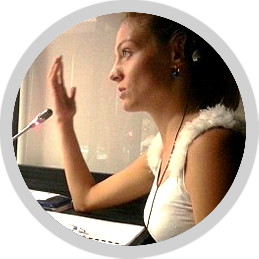
Zorana Lerotić completed the study of English and Italian Literature and the post graduate study of conference interpretation at the Faculty of Humanities and Social Sciences in Zagreb. Since 2012 she has been working as a court interpreter for English and Italian.
She has always loved languages and literature, and she thinks that being a translator enables you to always stay in contact with the language and to constantly develop. Zorana chose this profession because it enables her to keep in touch with a lot of interesting and current topics and because it requires you to always have an open mind and be ready to learn and discover new things, which is something she really takes pleasure in.
1. Translation: a calling or an occupation?
I am not sure if I would say it's a calling, I like to think of it more as my occupation, because it really occupies a lot of my attention. I do not know how else to describe the fact that I am always happy to deal with new translation topics or to have to read and proofread a new document, because it gives me an opportunity to research, learn and explore.
2. A literary or a commercial translation?
So far I haven't had the chance to do literary translations, and I believe they are really demanding. In fact, as a reader I experienced what it means when something is "lost in the translation", because unfortunately some books are so poorly translated that the style of the author is lost completely, and you as a reader do not get the feeling that the translation and the original are one and the same book. I am aware of all the challenges of literary translation and that is why I would never translate poetry. However, given a chance to translate a work of fiction and if I thought I was up to the challenge, I would gladly do it.
3. Would you rather translate 100 documents containing 1 custom page each or one document containing 100 custom pages?
It depends on the type of documents to be translated and the time I would have at my disposal. As we translators are well aware, the number of custom pages is a relative concept; sometimes you need more time to translate one custom page of a demanding text than 5 custom pages of a less demanding one. So I will answer idealistically: I prefer both if I am experienced with the topic.
4. What is your favorite translation in general and the favorite translation you did for Studio Nixa?
My favorite translation, or to be more accurate, interpretation, was the interpretation within one of the EU Twinning projects; the team I worked with was great, the topic interesting and very current and the project yielded more than positive results. As far as my favorite job for Studio Nixa is concerned, I would single out the interpretation in the WINPRO II project, because I was given the opportunity to work as an interpreter for two weeks straight, which is a rare opportunity in this profession, and I met great people and gained experience valuable in more ways than just in terms of translation.
5. Written translation or interpreting?
I believe that it is ideal to do both. Written translation enables the translator to have more time for research in terms of language in order to find the ideal language solution, which also improves interpreting skills. On the other hand, interpreting requires a different set of skills, which I will not further explain, and I personally like it because of the adrenaline before entering the booth, the dynamics and the current topics. Furthermore, I like interpreting because it makes me feel useful in that very moment and I can really see that communication would not be possible without interpreters. It's an especially nice feeling when after the job the speakers and participants thank you for enabling them smooth participation at the congress/seminar/workshop.
6. Simultaneous interpretation: the partner in the booth - always the same person or a different person each time?
I like to translate with my colleagues with whom I had already cooperated, and with whom I work well in the booth. As you know, simultaneous interpretation is for the most part a team effort and it means a lot to have a good colleague who will assist you, if needed. However, what I am really happy about regarding this job is that I have the opportunity to meet new people, and therefore I am looking forward to working with new people that I've never met before.
7. Written translation: With or without CAT tools?
I believe that in the future it will be unthinkable to translate without CAT tools, seeing as how they save time and are more efficient than us, mortal translators, when it comes to things such as concordance search. However, CAT tools, as their name says, are merely tools in the hands of a translator, and the most important thing determining the quality of a translation is what the translator is going to do with that tool and how they will use it. I would say that this is still an aspect of human translators that cannot be replaced by machines, at least not yet.
8. Working from home or at the office?
I prefer working at the office, having a separate place to work and fixed working hours. Working at home also has its advantages, but I would still always choose working in the office.
9. A freelance or a permanently employed translator?
I believe that it depends on the phase in life the person is in and on their character; some people can not handle the uncertainty of being freelance translators, and others can not deal with the routine of permanent employment which does not leave much free time. In any case, I think translation is a profession where you can work freelance and be content.